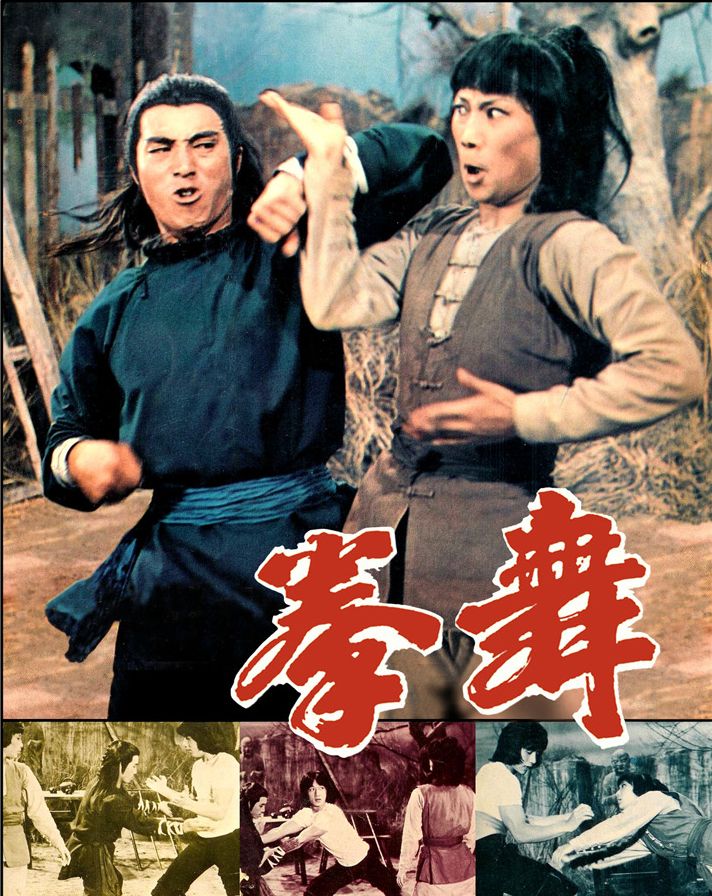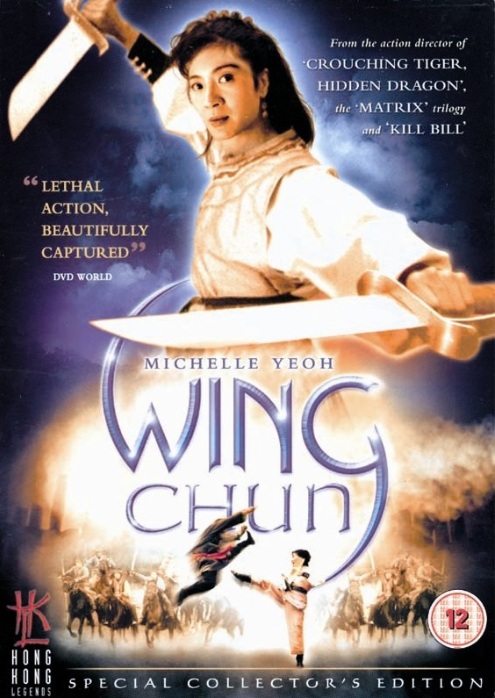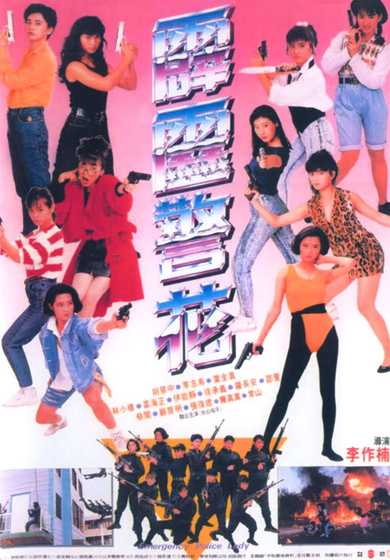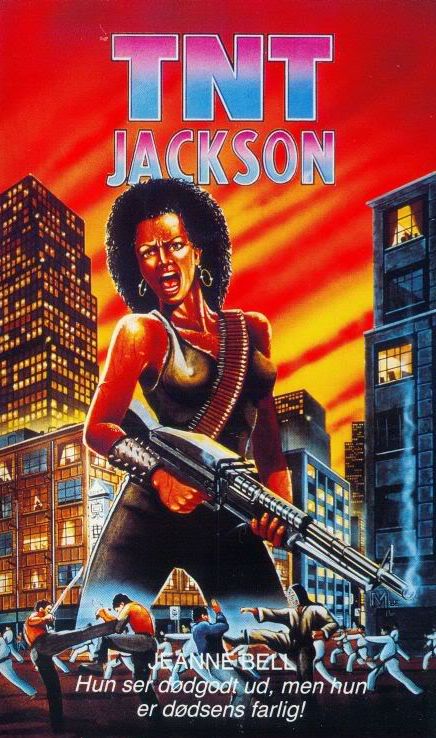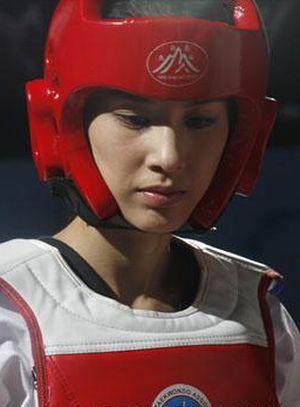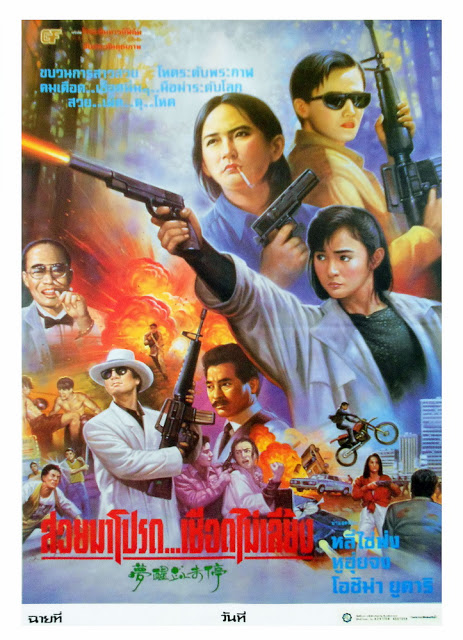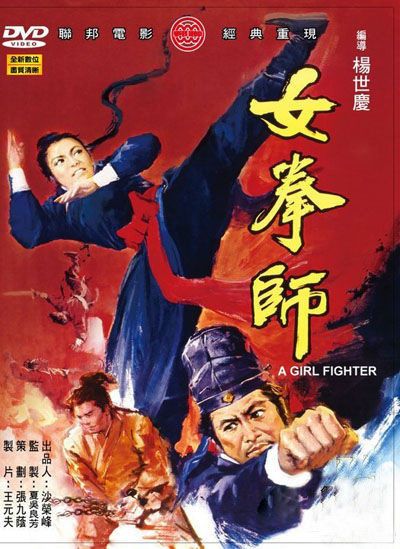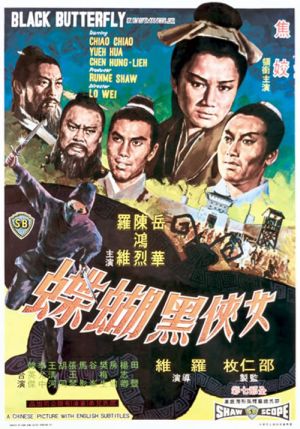★★
“Arsenal 1, Metropolitan Police 0”
 Sporting the subtitle “Forbidden Arsenal” – though if the poster (right) is anything to go by, it’s more of a domtitle – this further weakens the series by making Cynthia Khan only one-third of the action. She’s joined here by Chen (Lee), a cop from mainland China, and Hua (Do), a Taiwanese policemen, who get caught by the locals while they are operating, independently, in Hong Kong as part of their investigation of an arms smuggling gang run by Paul (Shou). Rather than deporting the uninvited guests, they are brought on to assist Madam Yeung (Khan), but soon discover one of the problems about taking on gun-runners: there’s a good chance they’re going to be rather better-armed than you.
Sporting the subtitle “Forbidden Arsenal” – though if the poster (right) is anything to go by, it’s more of a domtitle – this further weakens the series by making Cynthia Khan only one-third of the action. She’s joined here by Chen (Lee), a cop from mainland China, and Hua (Do), a Taiwanese policemen, who get caught by the locals while they are operating, independently, in Hong Kong as part of their investigation of an arms smuggling gang run by Paul (Shou). Rather than deporting the uninvited guests, they are brought on to assist Madam Yeung (Khan), but soon discover one of the problems about taking on gun-runners: there’s a good chance they’re going to be rather better-armed than you.
While still sporting some decent action – there’s a very good sequence near the start, with our heroine battling on top of a 16-wheeler – there’s far too much meandering around in the middle. You get lame stabs at comedy, which manage somehow to topple into homophobia: I can only presume the line, “They’ll get AIDS. The gays are inhuman. He can’t escape” lost a lot in translation. There are even worse ones at romance, as one of the cops conveniently falls for Paul’s sister. [Spoiler: not Madam Yeung, unfortunately. That might have been more interesting.]
Though I was somewhat intrigued by the spiky political commentary, resulting from the tensions between the steadfast but slow Communist from the mainland, the fiery Taiwanese, and the Hong Kong resident, concerned for the future. This was made in 1991, with an obvious eye to the handover of the colony to China, due later in the decade. So you get snarky dialogue such as “It’s not like China, military control does not exist here. We can’t use tanks to maintain order,” a pointed reference to the Tiananmen Square protests of two years previously, whose ruthless suppression was still fresh in the mind for locals.
Admittedly, when Khan is doing her martial arts thing, it’s still certainly worth a watch. That’s not least because the costume designer seems to have had a field day on this one – especially compared to the other entries in the series, where the characters seem to have worn whatever the actors were wearing when they showed up on set. However, when her two colleagues take over, it’s largely indistinguishable from one of the other ten billion Hong Kong action flicks of the time. And when everyone stops punching and shooting at each other, it’s well short even of that standard.
Dir: Yuen Chun Man
Star: Cynthia Khan, Waise Lee, Do Siu-Chun, Robin Shou
a.k.a. Forbidden Arsenal





 Make no mistake. By few objective standards could this be described as a “good” film. It is, however, one I found entertaining as all get-out, in a “WTF were they thinking?” kinda way. The main story has Hawaiian cop Jo Alwood (Ford) hunting sleazebag psycho mercenary Robert Kell (Broome), He killed Jo’s sister, among a slew of other women, just after she had accepted a position as bodyguard to bisexual S/M pop star Delilah (Mark), who is his final target. If this sounds a bit familiar, it’s a remake of 1992’s Blackbelt, by the same director, which starred Don ‘The Dragon’ Wilson as the cop. Ford isn’t as good as martial arts, but makes up for this shortcoming by the frequency with which she takes her top off. Heck, she even combines the two, and does martial arts clad only in a thong, which reminded me of another Roger Corman Philippino production,
Make no mistake. By few objective standards could this be described as a “good” film. It is, however, one I found entertaining as all get-out, in a “WTF were they thinking?” kinda way. The main story has Hawaiian cop Jo Alwood (Ford) hunting sleazebag psycho mercenary Robert Kell (Broome), He killed Jo’s sister, among a slew of other women, just after she had accepted a position as bodyguard to bisexual S/M pop star Delilah (Mark), who is his final target. If this sounds a bit familiar, it’s a remake of 1992’s Blackbelt, by the same director, which starred Don ‘The Dragon’ Wilson as the cop. Ford isn’t as good as martial arts, but makes up for this shortcoming by the frequency with which she takes her top off. Heck, she even combines the two, and does martial arts clad only in a thong, which reminded me of another Roger Corman Philippino production, 